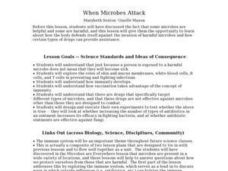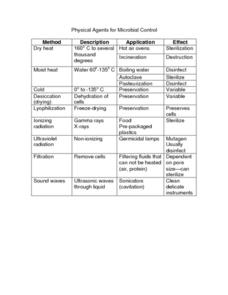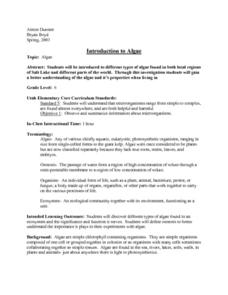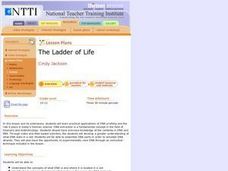Curated OER
Genes, DNA, and Mutations
With paper DNA patterns, budding biologists model translation and base-pair substitution within sequences. Through these activities, they examine how mutations can result in genetic disorders. The modeling that occurs is an enlightening...
Nuffield Foundation
Following Gene Transfer by Conjugation in Bacteria
After the lab, you'll be able to solve this analogy: Natural selection is to vertical transfer of genes as ___ is to the horizontal transfer of genes. Young biologists conduct an experiment on E. coli bacteria to explore the process of...
Bully Free Systems
Bully Free Lesson Plans—12th Grade
Two sample lessons from a curriculum unit on bullying provide high school seniors with an opportunity to assess their online and cell phone behavior and to consider how they can offer support to bullied students. Each plan includes an...
Teach Engineering
Common and Natural Logarithms and Solving Equations
Log some practice with logarithms. A PowerPoint presentation provides a tutorial on the change of base formula involving natural logarithms and solving exponential equations with logarithms in the fourth installment of a seven-part...
LABScI
Photosynthesis: How Do Plants Get Energy?
Examine the mechanism of photosynthesis through different light scenarios. Pupils vary the amount and type of light exposure on plant leaves in the fifth lesson plan in a 12-part series. Through observation, they determine the rate of...
Curated OER
Invisible Life
By setting up an aquarium in the classroom, learners are able to describe some macroscopic and microscopic organisms that are found inside. This well-designed, and educationally rich lesson requires pupils to use microscopes to view...
Space Awareness
Coma Cluster of Galaxies
Scientists classify everything from the smallest cells to the largest galaxies, but how do they decide on a classification system? Scholars use 40 pictures of galaxies taken by the Hubble Space Telescope to sort and try creating their...
Curated OER
Why Be Active?
Are there benefits to being physically active? Yes! There are both short-term and long-term benefits! Being physically active doesn't just have strengthen you physically, but also emotionally and socially. Learners find out how to...
California Academy of Science
Composting: A Scientific Investigation: California Academy of Sciences
Garbage, recycle, compost: Does it really matter where we put our trash once we are done? By making detailed observations over seven weeks, kids will see which materials break down naturally to become a healthy part of the soil, and...
Curated OER
Electrical Energy
Students compare and contrast a cell and a battery. In this physical science lesson, students explain how they create energy. They conduct an experiment to apply what they have learned in this lesson.
Curated OER
Student Cancer Journals -- Personal Reflections and Research on Life and Death Issues
Concepts learned in the study of mitosisand biochemistry help when making life or death decisions. Compile a notebook or portfolio of work related to the project can make the research more organized and relevant.
Virginia Department of Education
DNA Extraction from Strawberries
Has your class ever been astounded by the complexity of DNA analysis? Have they ever asked why genetic engineering has become so important to our daily lives? Young scientists perform DNA extraction on strawberries and explore how the...
Curated OER
When Microbes Attack
Students study how the body defends itself against the invasion of harmful microbes and how certain types of drugs can provide assistance. They design and execute their own experiments to test whether increasing the number of types of...
Curated OER
Beef and Beef By-Products
Learners examine the various types of beef and the many uses of its by-products. They increase their knowledge by playing a game of "beef bingo."They discuss what parts of beef animals are their by-products.
Curated OER
Physical Agents for Microbial Control
In this biology worksheet, students take part in an examination of the graphic organizer to determine the different types of environments and how they effect the survival of microbes.
Curated OER
Ready for Roots
Fourth graders sort seeds and predict what conditions are needed for them to germinate. They keep the seeds moist, observe and measure their growth and graph the results. As the seeds start to grow students compare and contrast the each...
Curated OER
Matching Flowers With Their Pollinators
Students match flowers to pollinators and construct models of
flowers to demonstrate why different kinds of flowers need different kinds of
pollinators. They use their flower models and the "Scientific Method Format" included in the...
Community Resources for Science
A Whole New World of DNA and Proteins
Lead your young scientists into an exciting world as they participate in a role play and experiment focused on proteins and DNA. After researching the Central Dogma of Biology, individuals or groups participate in a classroom...
Curated OER
Toxic Transmission
Students read article, "Toxic Transmission" and discuss technology pollution, specifically cell phone pollution and its ripple effects in other parts of the world.
Curated OER
Introduction to Algae
Students explore different types of algae found in both local regions of Salt Lake and different parts of the world. They discover different types of algae found in an ecosystem and the significance and function it serves.
Curated OER
The Ladder of Life
Students explain the concepts of what DNA is and where it is located in a cell, identify the two types of molecules that make up the rungs of a DNA molecule and identify the two types of Purine and Pyrimidine molecules
Curated OER
Colorful Fractions
Students use charts to show fractions. In this fractions and percents lesson, students review fractions, percents and ratios. Students create tables and color the cells to make different fractions. Students answer...
Curated OER
CONVECTION
Young scholars experiment to produce a visual convection current in the classroom and compare it to the images taken of convection cells in the Sun. They analyze the source of the Sun's energy and this type of energy transport.
Curated OER
Donating Blood
Students examine the facts of blood and discuss the different parts of blood and their function. They discover different people have different blood types and where they can go to donate blood.























